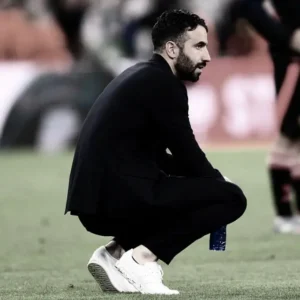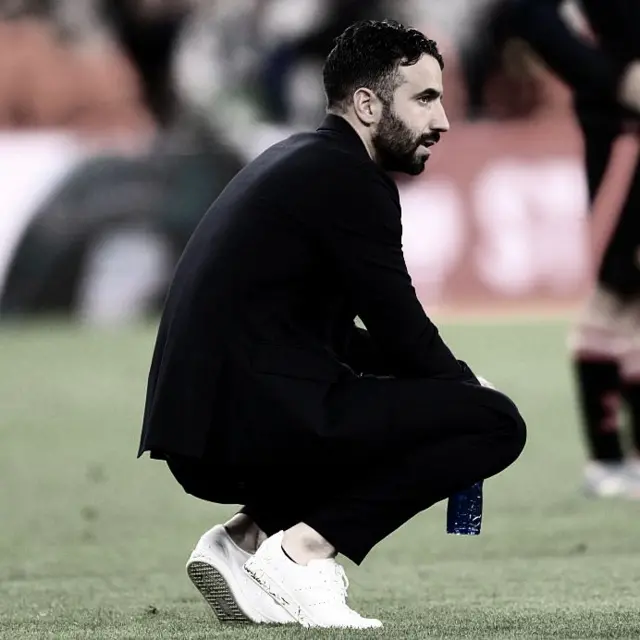Manchester United’s Post-Bilbao Blues: What the Defeat Means for Their Future

Manchester United departed Bilbao on Thursday with determination etched on their faces—but determination alone won’t fix what’s broken.
Publicly, the club remains fully behind manager Rúben Amorim, who, in the aftermath of the 1-0 loss to Tottenham, made a startling offer: if either the fans or ownership no longer believed in him, he would leave immediately, waiving any right to compensation. Despite this bold statement, United are already preparing for major summer changes, with a contingency transfer strategy in place and hopes of reshaping the squad.
The ambition to return to the top tier of English football remains. But sentiment and strategy must now grapple with some stark realities. Failing to secure European football next season, paired with mounting financial strain and operational downsizing, leaves the club at a crossroads.
Financial Fallout: The Cost of Missing Europe
United’s upcoming third-quarter financial report, due before July, is expected to highlight the full impact of their European exit. Early estimates suggest the defeat in Bilbao could cost the club around £100 million.
Here’s the breakdown:
-
Adidas Sponsorship Penalty: United’s failure to qualify for the Champions League triggered a £10m reduction in their £900m, 10-year deal. While the impact is spread across the contract’s duration, repeated failures could prove costly.
-
Premier League Placement Loss: Sitting in 16th place could cost United up to £33m compared to a fifth-place finish, with each position worth roughly £3m in prize money.
-
Lost Matchday Revenue: Each Champions League home game generates around £4.3m in gate receipts. Missing out on at least four home fixtures adds to the financial pain.
-
Operational Cuts: Following two rounds of redundancies—this time targeting the football department—Sir Jim Ratcliffe’s mission to trim costs includes eliminating staff perks and international scouting trips.
However, cost-cutting has its limits. The real financial burden remains in transfer fees and player wages, where United have notoriously underperformed. Over £900m has been spent on transfers in the past five years, with a £365m annual wage bill that shows little return on investment.
Transfer Budget: Tight Purse Strings, Expensive Targets
United’s spending capacity this summer is constrained. The club currently owes £272m in outstanding transfer fees, with £156m due imminently. Their 2024 fiscal year saw £113.2m in losses, not counting the £14.5m severance paid to Erik ten Hag and his staff.
Despite the financial crunch, the club is widely expected to pursue Matheus Cunha, with the Wolves striker’s £62.5m release clause looming. To finance this and other deals, player sales will be crucial.
Quick sales mean greater flexibility in the market. Delay, however, risks inflated prices and poor decisions—a lesson painfully learned in 2022, when the failed pursuit of Frenkie de Jong led to rushed, costly buys like Casemiro and Antony.
Who Could Leave: Stars, Surplus, and Stalemates
Unlike in previous seasons, no player is untouchable.
-
Victor Lindelof and Christian Eriksen will leave as their contracts expire.
-
Marcus Rashford, unsettled under Amorim, is open to leaving but unwilling to accept a wage cut. Barcelona is interested, but a deal seems complex.
-
Jadon Sancho could return from loan if Chelsea activates a £5m clause. His reintegration remains uncertain.
-
Alejandro Garnacho’s social media antics have stirred friction with Amorim. Chelsea’s past interest makes a transfer possible.
-
Andre Onana has drawn vague Saudi interest, while Altay Bayindir, likely to remain a backup, is expected to move.
There’s also uncertainty around highly paid veterans like Casemiro, Harry Maguire, and Luke Shaw, as well as newer faces like Mason Mount and Manuel Ugarte. Forgotten figures such as Tyrell Malacia and Antony (enjoying a solid loan at Real Betis) add to the surplus.
The striker duo of Rasmus Højlund and Joshua Zirkzee, linked with Serie A returns, may also depart—though high wages could complicate exits.
Bottom line: United may want a squad overhaul, but financial and contractual barriers mean only a fraction of their fringe players are likely to leave.
Amorim Under Pressure: Backed for Now, but Time Is Ticking
Rúben Amorim retains the board’s backing—for now.
Despite a dismal record of just six wins in 26 league games, United issued swift public support after Amorim’s candid comments. There are glimpses of tactical cohesion, like Wednesday’s precise first-half passing move that opened space for Patrick Dorgu—proof that Amorim’s structure is slowly taking shape.
Yet history shows that big clubs don’t tolerate poor form for long. At Real Madrid, Bayern, or Milan, a campaign like this would cost not one, but two managers their jobs. Amorim has avoided that fate so far, but next season must start with wins.
There are murmurs of player unrest and skepticism from former United stars over a relatively inexperienced coaching staff. Amorim must convert that scrutiny into progress—or risk becoming the next casualty.
What’s Next: Asia Tour, Friendlies, and Rebuilding
United wrap up their league campaign against Aston Villa before jetting off for a two-match Asia tour, reportedly worth up to £10m in revenue.
Though first-team players may not relish the journey, it’s a necessary financial move. One potential opponent? Fellow European absentees AC Milan, as a neutral-ground clash remains a strong possibility.
The silver lining of no European football is more time on the training pitch—a chance for Amorim to embed his system. But the downside? Fewer midweek matches and press conferences mean more media exposure and speculation around internal club issues.
Conclusion: A Club at a Crossroads
Manchester United remain one of football’s biggest stories—whether they’re winning or not. But behind the brand is a club struggling to reconcile ambition with execution.
This summer will define the next phase of the club’s identity. Amorim has a brief window to prove he’s the right man for the job. The board, meanwhile, faces tough decisions on finances, recruitment, and retaining fan faith.
United may not be good right now, but they’re still news. And that spotlight won’t dim anytime soon.
FOR MORE:
Alejandro Garnacho Sparks Manchester United Exit Rumors After Europa League Final Snub
Big Dunc: Duncan Ferguson’s Journey from Barlinnie Prison to Everton Legend
Man Utd’s future: Club resolute despite Tottenham loss – BBC Sport


Leave a Reply